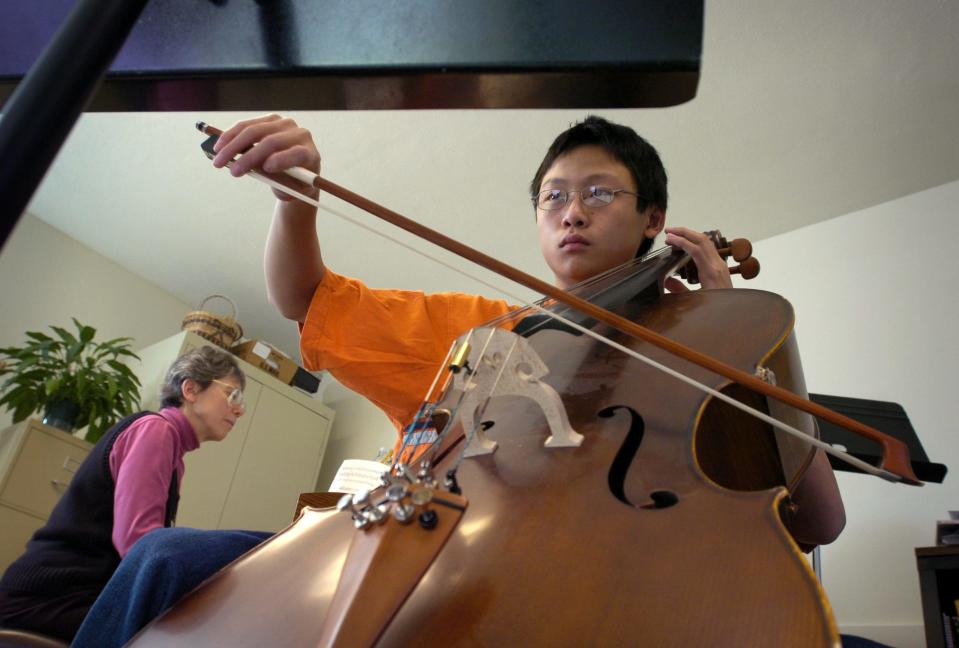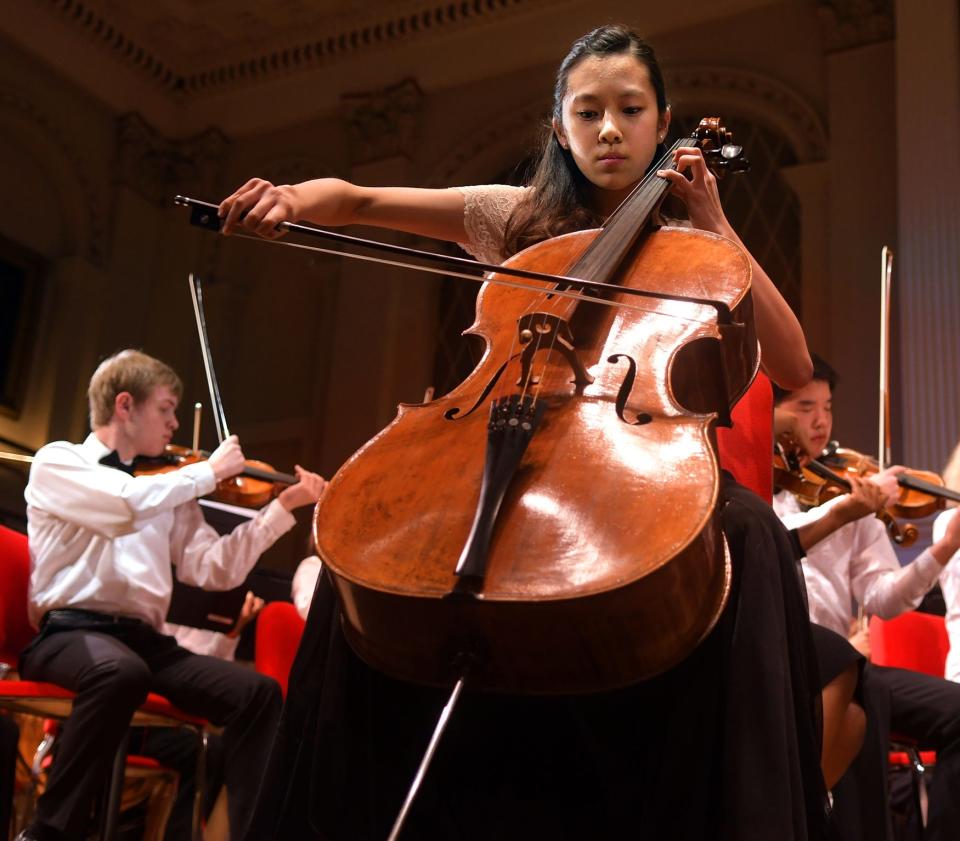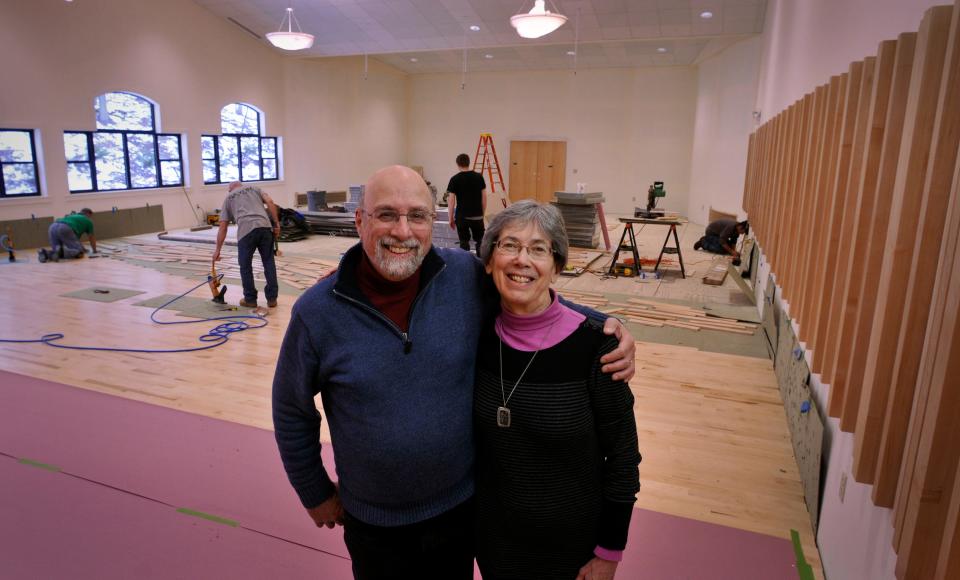Joy of Music Program founder Wendy Ardizzone's journey back to joy after stroke

WORCESTER — As she sat in a chair at a table in an alcove off the kitchen of her Worcester home, Wendy Ardizzone reflected during an interview, "Every stroke is different. That's something I've learned. What stroke survivors are left with is hopefully being able to rehabilitate to the highest level possible."
Ardizzone, 81, is the beloved founder of the Joy of Music Program (known to everyone as JOMP) which she ran with her husband, Rich Ardizzone, for more than 35 years before gradually turning over the reins to a new executive director while still staying active with the popular nonprofit community music school. She suffered a stroke on Oct. 1, 2022.
During the interview, Ardizzone was sitting in the same chair at the same table in the same alcove where the stroke occurred.
"The first thing — a roaring sound in my head, very loud. Then my vision doubled. It was off-kilter. I started feeling weak on my left side," Ardizzone said.
The left side weakness would affect her left hand. Ardizzone enjoyed played piano accompaniment for classes at JOMP and is a professional pianist, and the stroke potentially meant she might never play piano again. But Ardizzone approached the situation in undaunted style.
"When I realized at St. V’s (St. Vincent Hospital) that the road back to playing the piano would be a long one, one of my first goals was to regain my ability to clap so I could be a good audience member," she said.

'A very emotional day'
Just over a year later this past Oct. 29, Madeline Browning played the flute and Ardizzone accompanied on the piano as the two performed Mozart's Adante in C for flute and piano at First Unitarian Church of Worcester as part of the church's Music Sunday program.
Browning was the first person Ardizzone hired when she was establishing JOMP, and the two are longtime friends. "She's a fantastic accompanist," Browning said of Ardizzone.
Oct. 29 was World Stroke Day.
"I've always been very emotional. Since my stroke I've been feeling things even more deeply, both joy and sadness. And that a was a very emotional day for me," Ardizzone said of the performance. "A lot of people (watching in the audience) didn't know I had a stroke."
Ardizzone had notes she had written placed on the table in the alcove of points she wanted to make in the interview, but didn't really need to refer to them as she spoke easily but intently.
"The pandemic taught us so much and reminded us of so many important things as painful as it was on so many levels. Just the need to support each other. Each of our lives has so much uncertainty, and the need to be there for each other keeps going and growing," she said.
"Sometimes we know when we're having an immediate impact on somebody but what I'm experiencing is how far reaching the impact can be and personally I am drawing so much from people whose caring about me from the time I was little and on and on — just that impact continues. Every card, every message made a difference. Never doubt the difference you're making."
'Gratitude training'
Ardizzone said that even as she was suffering the stroke she felt a gratitude for certain things, such as the fact that she was at home and her husband was close by.
Over the years she's had gratitude training through counseling after she experienced stressful times while running JOMP. For example, after JOMP was at First Unitarian Church of Worcester for many years, a fire there in 2000 led to what would ultimately be a successful fund raising campaign and relocation of the school to its own home, but not without plenty of stresses.
"I just practically collapsed from exhaustion. I have a wonderful spirit, positive energy, but my therapist equated I was pushing a bus uphill that was out of gas. But I learned so much from that," Ardizzone said.
The gratitude training involved thinking of things each day that Ardizzone was grateful for "to keep the anxiety I was feeling about the school's future in perspective," she said. "Having stuck with that, it's with me all the time. Even if you may not need it on that day you're still practicing it every day."
On Oct. 1, 2022, in the alcove, "I was thinking, 'Oh my God, what's happening? I think I'm having a stroke. Thank God I'm here.' So gratitude is already starting to emerge," she said.
"I had worked, driven home. Rich was a few feet away. Gratitude that help was on the way. There was an ambulance ... Even in the ambulance I remember the EMT couldn't have been more gentle. He was was explaining everything he was doing, including getting me ready for an IV, looking down at me smiling. I said, 'I think you might want to know that I've cloned you. I see two of you.' My sense of humor was intact. He laughed. So that was a kind of unique connection from the beginning with a care giver who had been trained."

'The resiliency to keep going'
At St. Vincent Hospital the diagnosis was that Ardizzone has hypertrophic cardiomyopathy, a condition affecting the left ventricle, the main pumping chamber of the heart. This led to atrial fibrillation, an erratic heart beat to such an extent "that the blood gets pooled because it can't get out of the heart fast enough and forms clots. One of the clots formed in my brain," Ardizzone said.
Hypertrophic cardiomyopathy is usually a hereditary congenital condition but Ardizzone didn't know she had it. Her mother had suffered a stroke. "She wasn't discovered until several hours. The outcome for her wasn't good. That certainly stayed with me. I spent a lot of time with her."
Ardizzone said the kind of stroke she suffered can affect balance and in some cases vision and hearing. "Fortunately my memory is intact. There is no paralysis."
Ardizzone is obviously highly intelligent and speaks that way clearly. She uses a cane and is not driving again yet, but has no discernible mobility difficulties. She is on medication for hypertrophic cardiomyopathy, and the list of positives includes that she exercises, doesn't smoke, and eats well.
"The only thing was being way too stressed," she said.
The stresses had continued.
JOMP was founded in 1986 as a program of music and movement classes for preschoolers and grew into a regional school serving hundreds of children, teens and adults of all levels of musical development. The school's mission is "to enrich lives and foster community through accessible music education and performance."
After the fire at First Unitarian and a capital campaign, JOMP moved into its own facilities at 1 Gorham St. off Lincoln Street in 2002. The Joseph & Jordan Shapiro Concert Hall there was dedicated in 2016. Ardizzone was JOMP's director and Rich Ardizzone associate director. Then came the pandemic — in this instance, its emotional downside .
"My focus in the pandemic was to do everything I could to keep the school thriving under very trying conditions," Ardizzone said. "The staff — I don't have enough adjectives to describe their resiliency to keep going."
Jennifer Griffin Gaul, former director of Dana Hall School of Music in Wellesley, was hired as JOMP's executive director effective July, 2022. Wendy and Rich Ardizzone stayed on in an overlap to help with administration, in Wendy's case writing grants and continuing to secure donor support.
"I was feeling extremely stressed. The summer of 2022 was the first summer the school was able to be back fully. I was putting my heart and soul into grant writing, sending out letters to donors who were essential for the school's survival," she said.
"Nobody can tell me if the stress I was feeling those two years was responsible for the stroke, but it was a no-no."
'I worked very hard'
At St. Vincent Hospital, gratitude set in again. "I got wonderful care at St. V's," she said. "The medical team there really listened to me."
She was determined that she should begin rehabilitation right away, and went to Fairlawn Rehabilitation Hospital.
"It was intensive therapy. I worked very hard."
Physical therapy for the lower body, occupational therapy for the upper body.
"Those therapists, what they give to every patient is just extraordinary. I was just constantly moved by what I was witnessing and experiencing," Ardizzone said.
One therapist at Fairlawn was a former JOMP student and gave the word to Ardizzone's team that she was a professional pianist.
"We started focusing on specific things," she recalled about therapy that focused on playing the piano.
Her physical therapist told her, "I know this is primarily about occupational therapy, but physical therapy is important, too. We have to get you to go to the piano gracefully, sit down, and stand up." Although there was no physical piano, they practiced the moves.
"I turned 80 at Fairlawn. Again, gratitude," Ardizzone said. "I turned 80 at Fairlawn and I had nurses singing me happy birthday ... It was such a happy day. I was so grateful."
It wasn't too long before Ardizzone was able to return to working for JOMP, but at first it was just to "keep writing grants."
The occupational therapists were not specifically trained in getting a pianist back to the piano, but Ardizzone was asked to show with her right hand what her left hand needed to do again. There would be hand exercises at a table. "Just this incredible knowledge of what every muscle has to do," she said.
After a while, a therapist asked if Ardizzone, now home, had tried the exercises on her piano.
"I said, 'I don't think I'm emotionally ready.'" The therapist replied, "What we're doing is what we call occupational therapy. Part of your occupational therapy is you're a pianist." Ardizzone said she started crying. The therapist said, "OK, I'm hoping by next week you'll say you sat down in front of a piano. You don't have to play. You're physically ready."
She did. There would be more therapy — and exercises such as lifting weights at home. "If you can't lift your arm up you can't play."
Ardizzone remembered a practice technique Jack Radnusky, a teacher at Oberlin Conservatory of Music where she graduated with a degree in piano performance, had recommended to her when she was an undergraduate that strengthens the left hand. Now, years, later, her late teacher was helping her again, she noted.
Also now, "friends have been playing with me."

'Her progress has just been amazing'
Cindy Bizzarro teaches piano at JOMP — she said she's now the longest serving faculty member there — and has been a piano student of Ardizzone. The two are also friends.
They've been playing piano duets together since March.
"She was trying to strengthen her left hand. We get together every Friday," Bizzarro said. "Her progress has just been amazing. Every week she's show me something new that she couldn't (previously) do."
But the duets are not a one-way street. "I still learn from her," Bizzarro said. "Her knowledge is beyond belief. We're all learning and teaching."
Flutist Browning no longer teaches at JOMP, but said she went over to the music school to say hello to Ardizzone. Browning had been invited to play at First Unitarian Church's Music Sunday and told Ardizzone, "I'd love for you to accompany me."
The two got together and played "just for fun," Browning said. But impressed by what she saw, Browning told Ardizzone "If you can play just a little bit faster you'd be ready."
Ardizzone said she asked Browning to let her have the weekend to think about the Music Sunday performance.
"I felt very confident. It ended up being a win-win all around," Browning said. "She feels the depth and the joy of the music more than anyone and this has prevailed in spite of her stroke."
Ardizzone recalled saying at St. Vincent that she wanted to clap again. "And here I was on Music Sunday. World Stroke Day. It was amazing," she said.

'I'm still banished from the basement'
World Stroke Day annually highlights the World Stroke Organization’s Roadmap to improving stroke awareness, prevention and treatment as well as the rehabilitation and support of stroke survivors.
"I was playing in celebration of my partnership with Madeline and in honor of the medical and rehabilitation teams who are helping me get back to making a difference to other people through my playing," Ardizzone said.
"Madeline and I have been invited back (to Music Sunday) — Jan. 21, and have already chosen pieces by Bach and Rutter."
Wendy and Rich Ardizzone have been married 58 years and have three children and three grandchildren.
"Talk about gratitude. Just deepening our relationship," Wendy Ardizzone said of her husband's support. "He's so flexible, so supportive. He's still doing all the laundry. I'm still banished from the basement."
Rich Ardizzone said, "I'm in awe of what she's doing. Right from the start she had a really strong sense of gratitude and purpose. It was just amazing to see her in action. Her therapists loved her because she did all the exercises. It's very common (that) people don't do the exercises and don't get better. Her piano playing, it's amazing how fast she came back."
Back at JOMP, "I'm finding I can still make a difference. I'm playing with students again, which I just love," Wendy Ardizzone said.
She is phasing out her work with grants and donors. In the future she may still accompany students on the piano as a faculty member. Rich Ardizzone, who had been in charge of operations during the leadership transition, teaches trombone, world drums and jazz ensembles, and may also stay on the teaching faculty.
Wendy Ardizzone had previously said JOMP was created as a nonprofit music school that would belong to the community, and it was her hope that the school would endure beyond her tenure.
In that sense it is mission accomplished.
"Rich and I reached our goal of being able to pass along a healthy and thriving school to new leadership," she said.
"It’s wonderful to see our new director (Griffin Gaul) being able to enjoy moving the school forward on that foundation without the constraints of the pandemic."
Meanwhile, at JOMP a seven-year-old ukulele student "who has his lesson across from my studio appears in my doorway every week to see how I’m doing," Ardizzone said.
She's moved by his concern.
It all goes back to the need to support each other.
"When he asked about my cane I showed him how it helps me walk, let him hold it and answered all his questions. Recently he noticed the thumb brace I wear when I play the piano and asked why it’s so big. I showed him why it has to wrap around my whole hand just to protect my thumb. His empathy and curiosity touch my heart. I wonder what impact our friendship will have on this little guy who already has such a caring soul," Ardizzone said.
This article originally appeared on Telegram & Gazette: JOMP founder Wendy Ardizzone's journey back to joy after stroke

